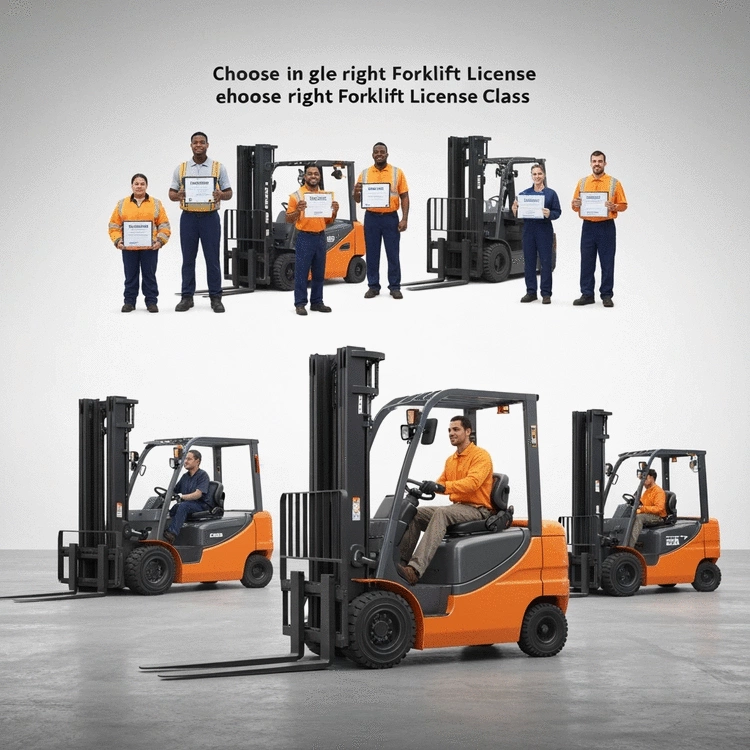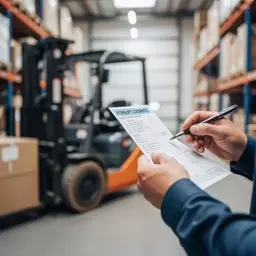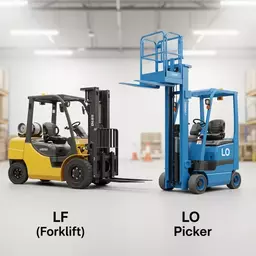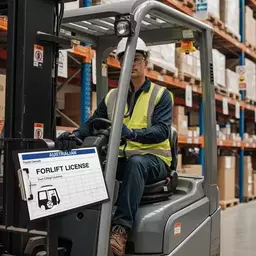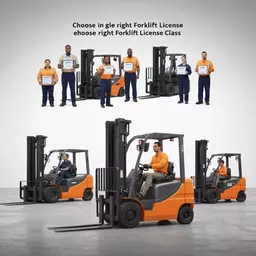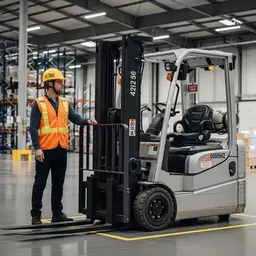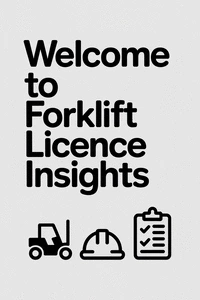In the realm of forklift operation, possessing the right license is more than just a requirement—it's a cornerstone of safety and career advancement. As industries continue to evolve, so do the opportunities for skilled operators. Are you ready to explore how a forklift license can transform your professional journey?
What You Will Learn
- Having a forklift license is crucial for job safety and compliance with Australian regulations.
- Possessing a valid forklift license enhances your employability in competitive job markets.
- Different forklift license classes (LF, LO, and high-risk) cater to specific operational needs and job roles.
- Understanding various types of forklifts will guide you in selecting the appropriate training and licensing path.
- Obtaining the right license can significantly elevate your career prospects and workplace safety standards.
Understanding Forklift License Classes and Their Importance
In Australia, possessing the correct forklift license is crucial for job safety, compliance, and career advancement. The visual below outlines the key license types and their associated benefits. For a deeper dive into the distinctions, read about the LF vs. LO forklift licence requirements.
LF License: Standard Forklifts
Required for operating common forklifts like counterbalance and reach trucks. Essential for a wide range of warehouse and construction jobs.
- ✓ Counterbalance & Reach
- ✓ Warehouse & Construction
- ✓ Broad Job Prospects
LO License: Order Pickers
Specific for operating order pickers and elevated work platforms, crucial in logistics and high-density warehousing environments.
- ✓ Order Pickers & EWP
- ✓ Logistics & Warehousing
- ✓ Specialized Roles
Why Licenses Matter
- • Enhances Job Prospects
- • Demonstrates Safety Commitment
- • Ensures Compliance Standards
- • Increases Confidence
Next Steps for Operators
- Evaluate Job Role
- Determine License Type
- Research Training Orgs
- Enroll & Train
- Apply for License
Understanding Forklift Licenses in Australia
When it comes to operating forklifts, having the right license isn't just a formality—it's essential for job safety and compliance with regulations. In Australia, a forklift license verifies that the operator is knowledgeable and skilled enough to handle these powerful machines responsibly. This is crucial because improper operation can lead to accidents that pose risks not only to the operator but also to coworkers and the working environment.
Moreover, many employers prioritize hiring individuals with the appropriate licenses, as it demonstrates a commitment to safety and professionalism. So, investing time and effort into obtaining your forklift license can significantly boost your career prospects in various industries.
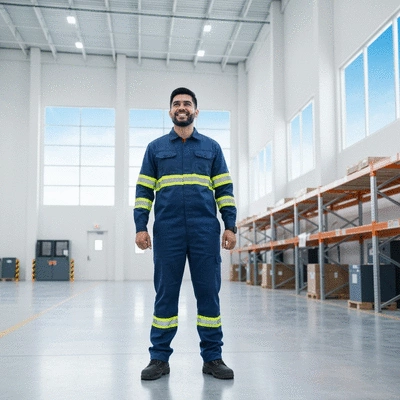
Why Forklift Licenses Matter in Your Career
In today's competitive job market, possessing a valid forklift license can set you apart from other candidates. It is a clear indication that you have undergone the necessary training and understand the compliance standards required for safe forklift operation. This level of expertise not only increases your employability but also opens up opportunities for higher-paying roles.
- Enhances your job prospects in logistics and warehousing.
- Demonstrates your commitment to workplace safety.
- Increases your confidence in operating forklifts effectively.
As someone passionate about promoting safe forklift operations through Forklift Licence Insights, I can tell you that the right certification can truly elevate your career. It’s not just about getting the job; it’s about being recognized as a skilled professional in your field! For more guidance, explore our forklift licence training guide for Australia.
Overview of Forklift License Classes in Australia
In Australia, there are several classes of forklift licenses, each designed for different types of operations. The most common types are the LF (forklift) and LO (order picker) licenses. These licenses cater to specific operational needs and ensure that operators are adequately trained for the tasks they will perform.
- LF License: This license allows you to operate standard forklifts, including counterbalance and reach forklifts.
- LO License: This is specific to operating order pickers and elevated work platforms, essential in logistics and warehousing settings.
- Other Classifications: There are additional classes for specialized machinery that may require specific training and licensing.
Understanding these classifications is vital as it helps you choose the right training path based on your career aspirations. As you navigate through the licensing process, keep in mind that selecting the right class will align your skills with job requirements in the industry.

Forklift Classifications: Understanding Different Types of Forklifts
Forklifts come in various types, each tailored for specific tasks and environments. Here’s a quick overview of the most common types you’ll encounter:
- Counterbalance Forklifts: These are the most common types, designed to lift heavy loads from the front.
- Reach Forklifts: Ideal for narrow aisles, these forklifts can extend their forks to reach high shelves.
- Industrial Lift Trucks: These include specialized forklifts used in manufacturing and warehousing.
Familiarizing yourself with the different types of forkllifts will help you understand which license may be most beneficial for your career. Each type has unique operating requirements and applications, and knowing these distinctions can enhance your effectiveness as a forklift operator.
Pro Tip
Did you know? Regularly attending refresher courses after obtaining your forklift license can enhance your skills and keep you updated on the latest safety regulations and best practices. This commitment not only boosts your confidence but also reinforces your dedication to workplace safety, making you a more valuable asset to potential employers.
Frequently Asked Questions About Forklift Licenses
- Q: Why is a forklift license important in Australia?
- A: A forklift license is crucial for job safety, compliance with Australian regulations, and significantly enhances an operator's career prospects and employability by demonstrating their knowledge and skill in handling these powerful machines responsibly.
- Q: What are the main types of forklift licenses in Australia?
- A: The two main types are the LF (forklift) license, which covers standard forklifts like counterbalance and reach trucks, and the LO (order picker) license, specific to order pickers and elevated work platforms used in logistics and high-density warehousing.
- Q: How does a forklift license improve career prospects?
- A: Possessing a valid forklift license sets you apart in the job market, indicates a commitment to safety and professionalism, and opens up opportunities for higher-paying roles in various industries, including logistics and warehousing.
- Q: What are the next steps to obtain a forklift license?
- A: To obtain a forklift license, you should evaluate your job role, determine the appropriate license type (LF, LO, or high-risk), research accredited training organizations, enroll in a training course, prepare for assessments, and gather all necessary documentation for your application.
Summary of Key Points on Forklift License Selection
Understanding the types of forklift licenses available in Australia is crucial for anyone looking to advance in the forklift operating industry. Each license serves a specific purpose and aligns with different job roles, ensuring that operators are equipped with the necessary skills and knowledge to perform safely and efficiently. Here’s a quick recap of the main types of forklift licenses:
- LF License: Required for standard forklift operations, essential for various warehouse and construction jobs.
- LO License: Necessary for operating order pickers and elevated work platforms, mainly in warehousing and logistics.
- High-Risk Work Licenses: Important for compliance and safety in jobs that involve operating forklifts in high-risk environments.
By obtaining the appropriate license, you not only comply with legal requirements but also enhance your job prospects and safety standards in your workplace. Remember, having the right license can make a significant difference in your career trajectory!
Next Steps for Aspiring Forklift Operators
Now that you have a clearer understanding of forklift licenses, it’s time to take action! The first step is to assess your job requirements. Consider the type of forklift operations you’ll be involved in and the specific license that aligns with those responsibilities. Here’s how to proceed:
- Evaluate your job role and the forklift operations required.
- Determine which forklift license you need (LF, LO, or high-risk).
- Research accredited training organizations in your area.
- Enroll in a training course and prepare for your assessments.
- Gather all necessary documentation for your license application.
Taking these steps will set you on the path to becoming a certified forklift operator. At Forklift Licence Insights, we’re here to support you through this process and provide you with the resources you need. Are you ready to start your licensing journey?
Engage with Us for More Information
We’d love to hear from you! If you have any questions, experiences, or stories about obtaining your forklift license, feel free to share them with our community. Engaging with fellow readers can provide valuable insights and support as you navigate your licensing journey. You can reach out through the comments or connect with us on our social media platforms. Together, let’s create a safer and more informed environment for forklift operators in Australia! Don't forget to check out our essential forklift safety rules for operators.
Recap of Key Points
Here is a quick recap of the important points discussed in the article:
- Obtaining a forklift license is essential for job safety and compliance with regulations in Australia.
- The LF and LO licenses cater to specific operational needs, enhancing employability in various industries.
- Understanding different types of forklifts and their requirements is crucial for selecting the appropriate license.
- Following a structured process for license application, from evaluating job roles to enrolling in training, is key to success.
- Engaging with the community can provide valuable insights and support as you navigate your licensing journey.
